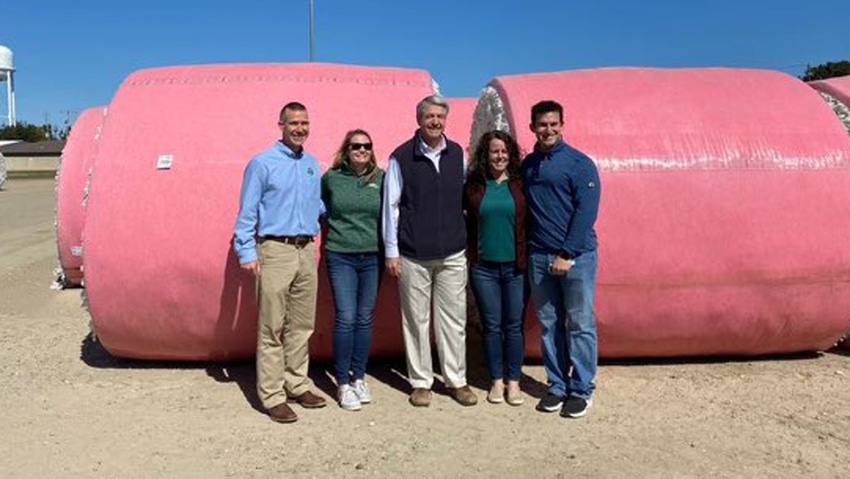
Arkansas kicked off an inbound trade mission on Oct. 15, sponsored in part by the National Association of State Departments of Agriculture (NASDA) and the USDA. Delegations from both Thailand and Vietnam spent two full days exploring agriculture in the Natural State during a tour hosted by the Arkansas Department of Agriculture.
This opportunity came from USDA funding awarded to NASDA through the Emerging Market Program (EMP). The program supports commercial trade relationships by promoting U.S. agricultural products to target markets around the world.
The visiting delegation spent the majority of their time in Arkansas before continuing the mission into Oklahoma and Texas. Arkansas Secretary of Agriculture, Wes Ward spoke of the delegation’s considerable interest in Arkansas agriculture.
“Visiting delegates were from a broad range that included row crop production, livestock, and forestry. We do all that here in Arkansas, so it was a good opportunity for them to come to one place and see the diversity of our state’s agricultural production,” he said.
Secretary Ward highlighted the trade mission that included eight delegates from Vietnam and nine delegates from Thailand: representing their Ministry of Agriculture, their embassy, and private companies with import and export interests. In addition, five NASDA representatives joined the Arkansas tour.
Arkansas cotton production
Arkansas exports products to both Vietnam and Thailand, with Vietnam ranked fifth in the state’s agricultural exports and Thailand ranked 13th.
The predominate commodities of interest are cotton, feed grain, and poultry. Of those, Ward said cotton is the largest export by far. To highlight Arkansas cotton production, the tour included a stop at the McGehee Producers Gin, Inc. in Desha County.
There, delegates met with local farmers including Joe Mencer, Sam Whitaker, and Sammy Angel who were on hand to represent the Arkansas cotton industry and discuss the state’s fiber production.
In addition, other agricultural advocates joined stops on tour to field questions and promote the industry; like Andrew Grobmyer, executive vice president and executive director of the Arkansas Ag Council, and Harrison Pittman, director of the National Ag Law Center at the University of Arkansas System Division of Agriculture.
Locally grown ingredients
Products locally grown in Arkansas were featured throughout the trip. Of those included a kitchen tour and a custom dinner prepared by the chef at Ben E. Keith Foods Midsouth Distribution Center in North Little Rock. During dinner, company representatives discussed their supply chain which also includes products from Vietnam and Thailand.
Ward said, “Delegates were very interested to hear how Ben E. Keith not only distributes agricultural commodities grown locally in Arkansas but also those from across the world.”
Eggs, a top Arkansas commodity, were a breakfast item provided by sponsorship from the Egg and Poultry Section of the state Agriculture Department.
Of course, rice was spotlighted as the state’s top commodity with emphasis on research and crop production. The visiting delegation learned about Arkansas rice from the field to the mill during a stop at the Division of Ag’s Rice Research and Extension Center located in Stuttgart. There they heard presentations from Extension rice agronomist, Jarrod Hardke and industry representatives from Riceland Foods and Producers Rice Mill Inc.
A tour of Isbell Farms showcased sustainable rice production and featured the Japanese sake varieties grown on the family farm in Humnoke. Part of the on-farm visit included a sake tasting, grown and brewed in Arkansas. This was made possible through the Isbell family’s partnership with Origami Sake, the state’s first sake brewery.
Additional trade mission highlights
Logistics and transportation were featured at two of the tour stops. Visitors experienced the Port of Little Rock that provides international distribution channels by air, road, train, and the Arkansas River. At the final tour stop, delegates visited Bruce Oakley, Inc. to learn about the company’s diverse global transportation network.
The trade mission concluded with dinner full of networking opportunities. Representatives from a host of Arkansas agricultural organizations joined Secretary Ward and NASDA for a Natural State sendoff at one of Little Rock’s most iconic restaurants, Doe’s Eat Place.
In all, Ward was pleased with the trade mission and the resulting relationships developed between the Arkansas ag industry and visiting delegations.
“One of the initial barriers to trade relationships is the government-to-government side of things,” Ward said. “Through this NASDA inbound trade mission, we had the opportunity to talk through anything from production, to regulation, to points of contact.
“All of that generated great discussion that I foresee being helpful in the future of Arkansas agriculture.”
About the Author(s)
You May Also Like






